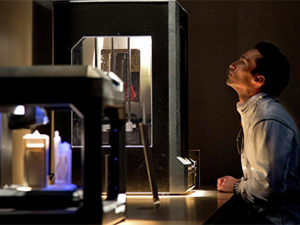



Date:21/09/17
 An artificial muscle that can lift 1,000 times its own weight has been created, laying the groundwork for Terminator-like humanoid robots.
An artificial muscle that can lift 1,000 times its own weight has been created, laying the groundwork for Terminator-like humanoid robots.
Scientists used a 3D printing technique to create the rubber-like synthetic muscle that expands and contracts like its biological counterpart.
Heated by a small electric current, the material was capable of expanding to nine times its normal size.
In tests it demonstrated enormous strength, having a strain density - the amount of energy stored in each gram of a stretched elastic body - 15 times greater than natural muscle.
The device, described as a "soft actuator", was able to lift 1,000 times its own weight, said the researchers whose work is reported in the journal Nature Communications.
Professor Hod Lipson, from the Creative Machines laboratory at Columbia University in New York, said: "We've been making great strides toward making robot minds, but robot bodies are still primitive.
"This is a big piece of the puzzle and, like biology, the new actuator can be shaped and reshaped a thousand ways. We've overcome one of the final barriers to making lifelike robots."
Artificial muscles may not only be used in robots but also sensitive surgical devices and a host of other applications where gripping and manipulation is important.
Co-author Dr Aslan Miriyev, also from the Creative Machines lab, said: "Our soft functional material may serve as robust soft muscle, possibly revolutionising the way that soft robotic solutions are engineered today.
"It can push, pull, bend, twist, and lift weight. It's the closest artificial material equivalent we have to a natural muscle."
The long-term aim is to accelerate the artificial muscle's response time and link it to an artificially intelligent (AI) control system, said the researchers, who were part-funded by the Israeli defense ministry.
Scientists create synthetic muscle that can lift 1,000 times its own weight
 An artificial muscle that can lift 1,000 times its own weight has been created, laying the groundwork for Terminator-like humanoid robots.
An artificial muscle that can lift 1,000 times its own weight has been created, laying the groundwork for Terminator-like humanoid robots.Scientists used a 3D printing technique to create the rubber-like synthetic muscle that expands and contracts like its biological counterpart.
Heated by a small electric current, the material was capable of expanding to nine times its normal size.
In tests it demonstrated enormous strength, having a strain density - the amount of energy stored in each gram of a stretched elastic body - 15 times greater than natural muscle.
The device, described as a "soft actuator", was able to lift 1,000 times its own weight, said the researchers whose work is reported in the journal Nature Communications.
Professor Hod Lipson, from the Creative Machines laboratory at Columbia University in New York, said: "We've been making great strides toward making robot minds, but robot bodies are still primitive.
"This is a big piece of the puzzle and, like biology, the new actuator can be shaped and reshaped a thousand ways. We've overcome one of the final barriers to making lifelike robots."
Artificial muscles may not only be used in robots but also sensitive surgical devices and a host of other applications where gripping and manipulation is important.
Co-author Dr Aslan Miriyev, also from the Creative Machines lab, said: "Our soft functional material may serve as robust soft muscle, possibly revolutionising the way that soft robotic solutions are engineered today.
"It can push, pull, bend, twist, and lift weight. It's the closest artificial material equivalent we have to a natural muscle."
The long-term aim is to accelerate the artificial muscle's response time and link it to an artificially intelligent (AI) control system, said the researchers, who were part-funded by the Israeli defense ministry.
Views: 373
©ictnews.az. All rights reserved.Similar news
- Justin Timberlake takes stake in Facebook rival MySpace
- Wills and Kate to promote UK tech sector at Hollywood debate
- 35% of American Adults Own a Smartphone
- How does Azerbaijan use plastic cards?
- Imperial College London given £5.9m grant to research smart cities
- Search and Email Still the Most Popular Online Activities
- Nokia to ship Windows Phone in time for holiday sales
- Internet 'may be changing brains'
- Would-be iPhone buyers still face weeks-long waits
- Under pressure, China company scraps Steve Jobs doll
- Jobs was told anti-poaching idea "likely illegal"
- Angelic "Steve Jobs" loves Android in Taiwan TV ad
- Kinect for Windows gesture sensor launched by Microsoft
- Kindle-wielding Amazon dips toes into physical world
- Video game sales fall ahead of PlayStation Vita launch





















